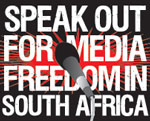To form and fund the commission is a thoroughly sensible, credible move on the part of the South African National Editors' Forum (SANEF) and Print Media SA (PMSA), which represents the media owners. But the ANC has already said the framework of the commission's mandate is too narrow and I'm sure it will dismiss its findings - due in the first part of next year - on the basis that it should also have considered whether the press needs an independent, outside regulator.
The commission's mandate is to investigate if and how self-regulation of the South African press should be strengthened. It is a separate process to that started by the Press Council of South Africa - under which the press ombudsman falls. The Press Council has held public hearings across the country to get people's views on the ombudsman's role and processes.
However, deputy press ombudsman Johan Retief fully expects the report emanating from the public meetings held by the Press Council - which is also funded by SANEF and PMSA - to be given to the Press Freedom Commission for consideration.
ANC govt, print media battle recap
If you've lost track of this long-running battle between the ANC government and print media, the short form is:
- The ANC is arguing that the print media does not adequately reflect the aspirations and lives of all South Africans and, it says, self-regulation through the ombudsman is not enough to protect the public from the press. The party wants some sort of statutory oversight of the print industry: a media appeals tribunal.
- Further, the ANC says it is too expensive for most people to sue newspapers through the courts and although, it doesn't cost a cent to complain to the ombudsman, the ANC seems to doubt the ombudsman's independence.
- It is important to note that the ombudsman's office does not fine offenders but its findings are absolutely binding - usually taking the form of ordering a newspaper to apologise if a ruling goes against it. It also publishes all of its findings in full on its website. If a member of the public goes to the ombudsman, however, he or she waives the right to sue.
Press ombudsman Joe Thloloe has vowed that the council will not make concessions to simply appease the ANC and that any changes to its processes will be made only if they are in the interest of the media.
However, already we may be seeing signs of the media itself conceding territory where there is no need. Late last year a Rapport editorial proposed "independent regulation", where a panel of stakeholders from outside both the media and the state would appoint a "tribunal". [Read the English translation.]]
Thin edge of the wedge
I'm totally with Prof Guy Berger, part of the School of Journalism and Media Studies at Rhodes, on opposing Rapport's suggestion on the basis that this is probably the thin edge of the wedge. Berger raised important questions about an independent regulatory body in a Thought Leader column, chiefly:
- "Who would appoint the envisaged 'independent' panel? Should churches and vice-chancellors unions elect these people? Chiefs, the Bar Council, sports associations, etc? Where do you stop?
- "Who would pay for this 'independent' tribunal? If it's the state, can political temptation really be held at bay?
- "Lastly, would this 'independent' tribunal have state power to enforce its rulings? And if so, isn't this - in principle - a dangerous tool that violates the professional autonomy of the press?"
And, I'd like to add: "Show some backbone, mense, and hold firm". This is exactly the kind of concession the ANC would like to pressure us into when, in fact, the party appears less interested in the SA public's feelings about newspapers than in protecting itself from the press' traditional watchdog function, its exposés of corruption and maladministration, and its independent analysis and criticism of the government.
Real danger that SA media will back down
Looking at Rapport's sentiments, I fear there is a real danger that we in the SA media will back down on crucial principals of press freedom, especially now that politicians in the UK are calling for its self-regulatory system to be revamped in the wake of the News of the World melt down.
Support for an independent body rather than self-regulation in SA gathered pace this week with spin doctor and former journalist Chris Vick saying in a piece for the Daily Maverick that he thinks an independent regulator is the only way to go. And a Business Day editorial said:
"While our heart is with the self-regulators in the media debate, our head isn't. We have to ask this question: If media regulation needs to be independent of politicians, does it not also need to be independent of journalists and publishers? ... The point, anyway, isn't what regulation works or doesn't. The point is what the public is comfortable with."
Meanwhile, Jane Duncan, the Highway Africa Chair of Media and Information Society at Rhodes University's School of Journalism and Media Studies, told Bizcommunity that she was disappointed about the absence of the voice of the working journalist in the Press Freedom Commission.
"Journalism is not rocket science"
"Journalism is not rocket science," Duncan said, "it does involve some level of skills in editorial decision-making, which journalists have and others don't have. Not even lawyers can make these decisions, as the domains of law and ethics differ. That is why you want the balance of power in a Press Council to be held by journalists."
The fact that the advent of the commission can spur such divergent views tells us that our media is actually quite healthy - that journalists and journalism academics are thinking deeply about our self-regulation system.
What the public wants - or "is comfortable with", as Business Day puts it - is harder to tell but ultimately, people endorse you with their decision to buy your paper. And South Africans are not only buying millions of papers every day but the total reading universe has actually increased over the past decade with the explosion of the tabloid press.
In the end, it will come down to the journalists to fight for the freedom of the press because that's their job - just as it was in the apartheid days - so I'd say journalists are the most appropriate judges of how to report freely, truthfully and responsibly.
Press ombudsman taken very seriously
As I've written before, the press ombudsman is taken very seriously by newspaper editors. Journalists fret when they discover a story of theirs is subject to a complaint and, if an important decision goes against them, their reputations remain under a cloud for quite a long time.
Further, you couldn't get a more credible, thoughtful duo at the ombudsman's office than Thloloe and his deputy Retief. The upside of all the hoo-hah around the ombudsman is that it is getting more complaints than ever before - about 250 in 2010 compared with 150 in 2009, says Retief. This is positive as it means more members of the public are aware of the ombudsman and what it can do for them, says Retief. (It's clear, however, that it could do with more staff.)
Before we get our knickers in a knot about what we, the SA media, can learn from the NoW (#NOTW), it's worth noting that Roy Greenslade, the respected media blogger at The Guardian, has pointed out that a new regulatory body for the British press will probably be very similar to the one it replaces.
"It is easy to talk down the PCC [Press Complaints Commission in the UK], and easy to say it should be replaced, but everyone in the industry knows... it isn't easy to create a body much different from the current one without compromising press freedom (or antagonising proprietors)... [Prime Minister David] Cameron and [Labour Party leader Ed] Miliband are politicians acting like politicians (ie, they're playing to the public gallery without thinking things through). But are they wise?
"There is no alternative"
"Anyway, let me predict the result: a body will be created with a new name, new members, a new staff (pity - because the current crop are excellent), a new logo, a new website (a good one was already under way at the PCC) and it will be much the same as the current commission. There is no alternative."
SA's press may be modelled historically on the UK's but the two countries' media industries operate in very different circumstances because of one crucial issue: the UK does not have a constitution and, therefore, the libel laws are among the most onerous in the world.
We, in SA, are more fortunate. There is little doubt that the ANC will pursue its combative course against the press - press commission or no press commission - but we need to stick to our constitutionally enshrined guns.
For more:














































